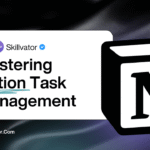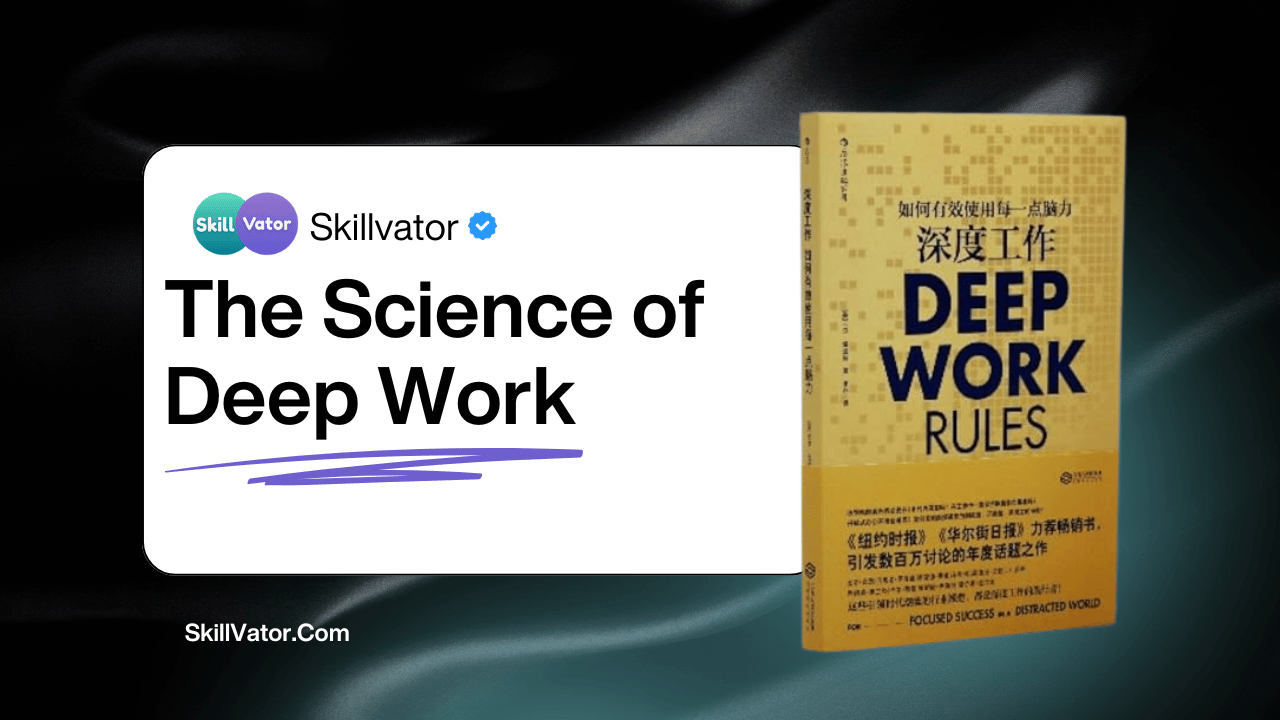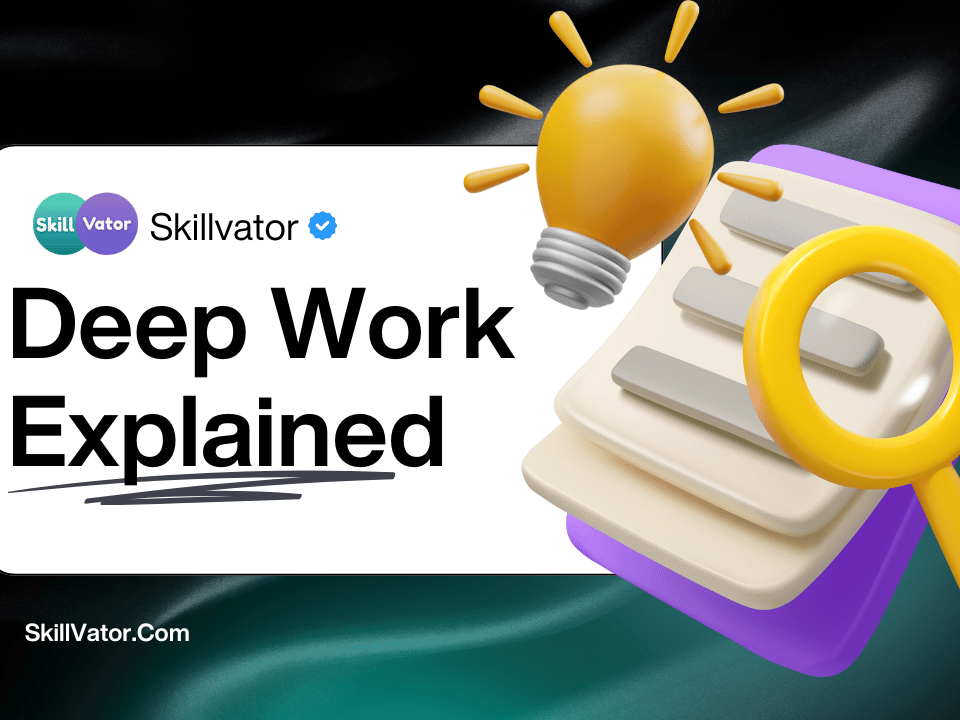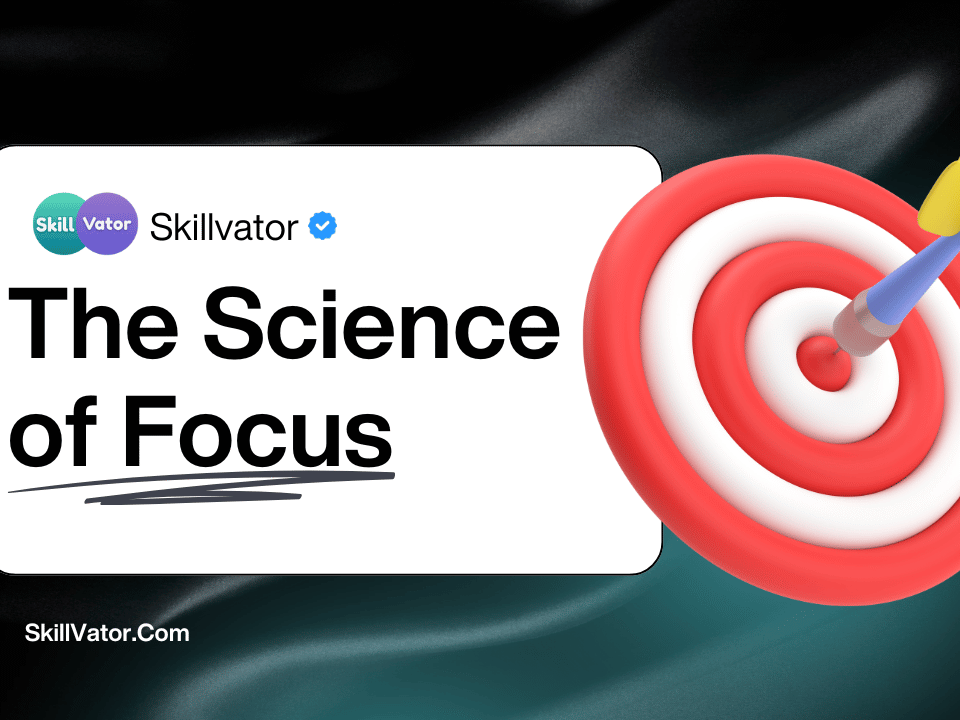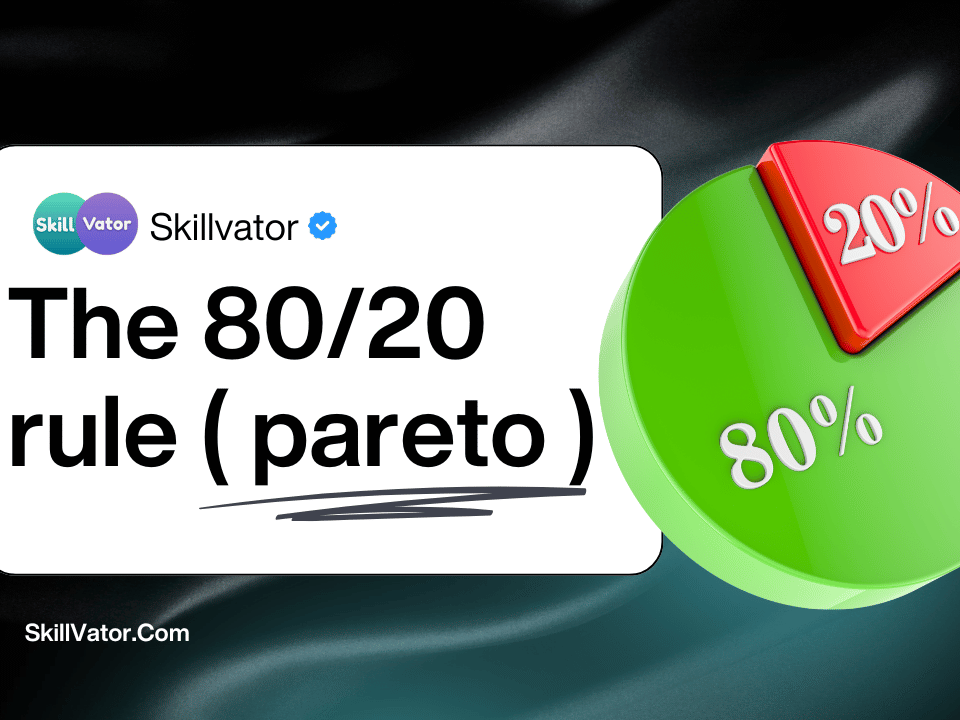You sit down to work — and within minutes, your phone buzzes, an email pops up, and your brain starts drifting to something else.
Sound familiar? The Science of Deep Work In this article You Know it !
We live in a world where distraction is constant and attention is the most valuable — yet most fragile — resource. Notifications, meetings, multitasking, and endless scrolling make it nearly impossible to focus deeply for more than a few minutes.
But in a world of noise, focus is your competitive advantage.
At Skillvator, we help professionals, creators, and teams reclaim control of their time and attention. The ability to engage in deep work — focused, undistracted effort on cognitively demanding tasks — is the foundation of real productivity, creativity, and career growth.
In this article, we’ll explore the science behind deep work, why it matters, and how to build a system that helps you thrive in a distracted world.
What Is The Science of Deep Work?
The term “Deep Work” was coined by productivity researcher and author Cal Newport, who defines it as:
“Professional activities performed in a state of distraction-free concentration that push your cognitive capabilities to their limit.”
In simple terms, deep work means working on something hard — with full focus — for an extended period.
It’s the opposite of shallow work, which includes:
-
Checking emails
-
Attending status meetings
-
Scrolling through updates
-
Doing repetitive administrative tasks
Both types of work have their place — but deep work creates value, while shallow work maintains it.
The Neuroscience of Focus: What Happens Inside Your Brain
When you focus deeply, your brain enters a powerful state called “flow” — where concentration, creativity, and performance peak.
Let’s break down what happens neurologically during deep work:
| Brain Mechanism | Description | Impact |
|---|---|---|
| Prefrontal Cortex Activation | Your decision-making and problem-solving center lights up. | Enhances reasoning and creativity. |
| Dopamine Regulation | Dopamine rewards focus and completion, creating motivation loops. | Makes concentration feel satisfying. |
| Myelin Growth | Repeated deep focus builds myelin (brain insulation) around neurons. | Improves speed and efficiency of thought. |
| Reduced Task Switching | Fewer distractions mean less cognitive friction. | Saves mental energy and increases clarity. |
Every time you enter deep focus, you’re literally rewiring your brain to become better at concentrating.
Why Deep Work Matters in the Modern Workplace
We live in the attention economy — where every app, ad, and platform competes for your focus.
The ability to work deeply is becoming increasingly rare — and therefore, increasingly valuable.
💡 The Skillvator Advantage:
Professionals who master deep work:
-
Complete high-impact projects faster
-
Learn complex skills more effectively
-
Experience less burnout
-
Produce original, creative ideas
-
Stand out in competitive industries
In short, deep work is not just a productivity hack — it’s a career superpower.
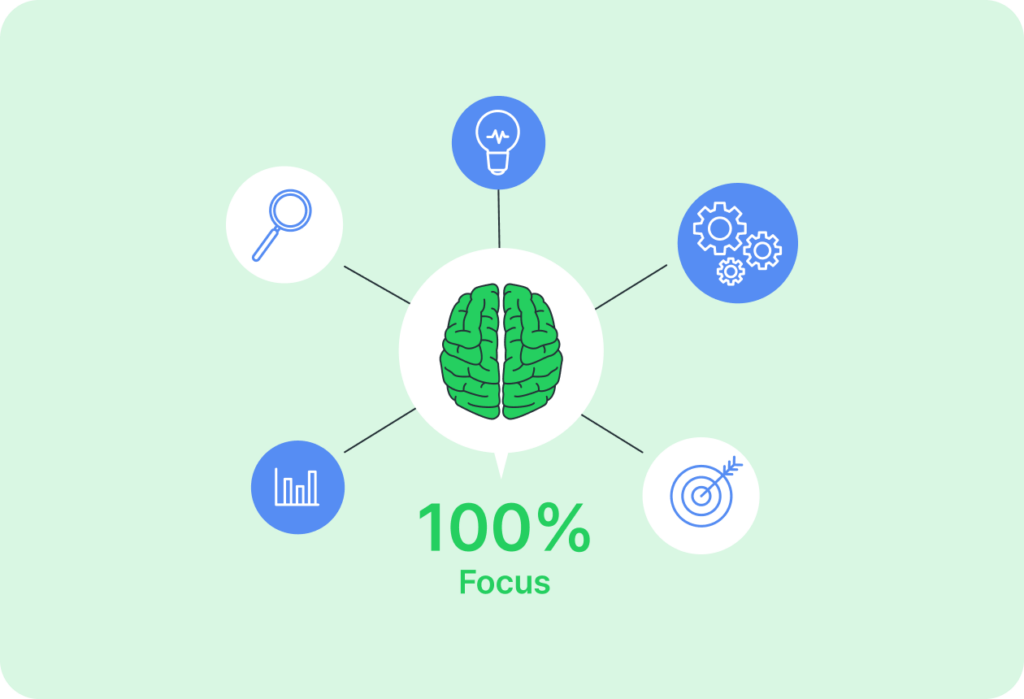
The Science of Deep Work
The Cost of Shallow Work
Shallow work gives the illusion of productivity — but often keeps you busy without moving you forward.
| Shallow Work Trap | Result |
|---|---|
| Constant context switching | Mental fatigue and poor memory retention |
| Excessive multitasking | Lower focus and reduced work quality |
| Reactive work mode | Always responding instead of creating |
| Digital distractions | Fragmented attention and decreased creativity |
Studies show that even brief interruptions can double your error rate and reduce focus for up to 20 minutes after each distraction.
That means checking your phone 10 times a day could cost you over three hours of lost deep focus.
The Four Principles of Deep Work (Skillvator Framework)
At Skillvator, we’ve adapted Cal Newport’s concepts into a practical, modern framework built for today’s digital professionals:
| Principle | Description |
|---|---|
| 1. Focus with Intention | Design focus sessions that prioritize depth over speed. |
| 2. Eliminate Distraction | Engineer your environment for sustained concentration. |
| 3. Work in Rhythms | Use cycles of deep and shallow work to maintain energy. |
| 4. Measure Output, Not Time | Focus on results, not hours spent. |
Let’s explore how to apply each of these principles effectively.
1. Focus with Intention
Deep work starts with intentional focus — not just sitting at your desk and hoping to concentrate.
Here’s how to create it:
-
Define your “One Thing.” What’s the single most important task for the day?
-
Set a clear outcome. What will success look like for this session?
-
Use a timer. Start with 50–90 minute focus blocks followed by short breaks.
-
Track your deep hours. Use a Notion tracker or Skillvator’s Deep Focus Template to measure progress.
Skillvator Tip:
Schedule deep work when your energy peaks — usually within the first 3–4 hours after waking.
2. Eliminate Distraction
You can’t rely on willpower alone — your environment must make focus easy.
🔹 Physical Environment
-
Declutter your workspace.
-
Keep only the tools you need for the current task.
-
Use noise-canceling headphones or ambient focus music.
🔹 Digital Environment
-
Turn off non-essential notifications.
-
Use “Do Not Disturb” mode.
-
Block distracting websites (via Freedom, Cold Turkey, or Notion Focus Mode).
🔹 Mental Environment
-
Clear your mind before deep work (journaling, meditation, or a short walk).
-
Write down any intrusive thoughts to revisit later.
Skillvator Insight:
Distraction isn’t just about devices — it’s about design. The less friction between you and focus, the easier it becomes to enter deep work.
3. Work in Rhythms
Deep work thrives on consistency.
Random bursts of focus don’t build mastery — routines do.
Skillvator recommends three rhythm styles:
| Rhythm Type | Description | Best For |
|---|---|---|
| Monastic | Entire days reserved for deep focus | Creators, researchers, writers |
| Bimodal | Split between deep and shallow days | Entrepreneurs, managers |
| Rhythmic | Daily fixed sessions (e.g., 9–11 AM) | Professionals with tight schedules |
Pick one that fits your lifestyle, and protect those hours fiercely.
4. Measure Output, Not Time
Productivity isn’t about how long you work — it’s about what you produce.
At Skillvator, we teach a Results-Based Productivity approach:
-
Replace “8 hours of work” with “3 hours of focused creation.”
-
Define success metrics for each session.
-
Review what moved the needle, not what filled your schedule.
Skillvator Formula:
Deep Work = (High Focus x Time Spent) – (Distraction x Context Switching)
The fewer distractions you allow, the more exponential your results.

The Science of Deep Work
The Science of Flow: The Gateway to Deep Work
Flow is a state where you lose track of time because you’re fully immersed in the task.
Neuroscientist Mihaly Csikszentmihalyi identified it as the optimal experience for performance and happiness.
Signs You’re in Flow:
-
Total absorption in the task
-
Reduced self-consciousness
-
Effort feels easy
-
Time seems to disappear
Flow isn’t luck — it’s triggered by specific conditions:
-
Clear goals
-
Immediate feedback
-
A balance between challenge and skill
-
Minimal distractions
Skillvator Tip:
Match your tasks to your skill level — too easy = boredom, too hard = anxiety. Flow happens in the sweet spot between the two.
How to Train Your Brain for Deep Work
Like physical fitness, focus is built through repetition.
Here’s the Skillvator brain-training formula:
🧠 1. Practice Focus Intervals
Start with 25-minute Pomodoro sessions, then gradually extend to 60–90 minutes of uninterrupted work.
🧘 2. Strengthen Mental Endurance
Meditate daily — even 5 minutes of breath focus can increase attention span over time.
🕒 3. Protect “Deep Work Hours”
Block 2–3 hours of focus time in your calendar. Treat it like an unmissable meeting.
🚫 4. Rewire Dopamine Habits
Reduce quick dopamine hits from social media, endless scrolling, or constant notifications.
Instead, reward yourself after completing deep sessions — not during them.
Tools and Techniques for Deep Work
Here are Skillvator-recommended tools to make deep work your new normal:
| Tool / Technique | Purpose |
|---|---|
| Notion | Plan deep sessions, log goals, and track focus hours |
| Forest / Focus To-Do | Gamify focus by growing virtual trees |
| Freedom / Cold Turkey | Block distractions |
| Time Blocking | Schedule uninterrupted focus periods |
| Noise Apps (Noisli, Brain.fm) | Create a distraction-free soundscape |
| Skillvator Deep Work Template | Combine scheduling, journaling, and reflection in one Notion dashboard |
Skillvator Insight:
Tools don’t make you productive — systems do.
Use tools that simplify your process, not complicate it.
Creating a Deep Work Routine (Skillvator 5-Step Model)
-
Plan It: Identify one high-impact task for the session.
-
Prepare It: Eliminate distractions and gather everything you need.
-
Protect It: Block 60–90 minutes on your calendar.
-
Perform It: Enter deep focus — no multitasking, no interruptions.
-
Reflect It: Journal what you accomplished and how you felt.
Repeat this daily, and your ability to focus will compound like interest.
Common Obstacles to Deep Work (and How to Overcome Them)
| Challenge | Why It Happens | Skillvator Solution |
|---|---|---|
| Constant interruptions | Poor boundaries or unclear priorities | Create “Focus Hours” — communicate them clearly to others |
| Mental fatigue | Working too long without breaks | Use 90-minute work cycles + 15-minute rests |
| Digital distractions | Dopamine-seeking behavior | Block apps & reward focus, not distraction |
| Fear of missing out (FOMO) | Anxiety about being unavailable | Remind yourself: focus now, connect later |
| Lack of motivation | Unclear goals or purpose | Reconnect with why your task matters |
Deep Work and Work-Life Balance
Deep work isn’t about working harder — it’s about working smarter.
By concentrating your energy on what matters, you can:
-
Finish important work faster
-
Enjoy guilt-free downtime
-
Reduce burnout and mental clutter
At Skillvator, we call this Work-Life Harmony — where productivity supports your personal well-being instead of stealing from it.
Conclusion: Focus Is the New Superpower
In a distracted world, the rarest skill is the ability to focus.
Deep work isn’t easy — but it’s a learnable skill that can transform your productivity, creativity, and peace of mind.
When you master deep work:
-
You’ll create more in less time.
-
You’ll feel more fulfilled, not just busy.
-
You’ll stand out in a world that’s constantly distracted.
At Skillvator, our mission is to help you work better, grow faster, and live smarter — and deep work is the foundation of that transformation.
Start small: one session, one hour, one distraction-free block of focus.
Your future self — calmer, sharper, and more accomplished — will thank you.

